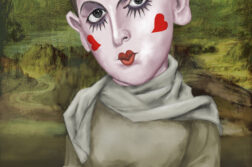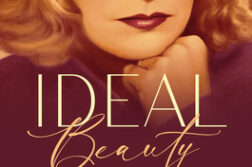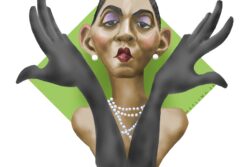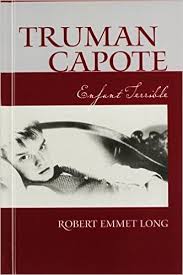 Truman Capote? Enfant Terrible
Truman Capote? Enfant Terrible
by Robert Emmet Long
Continuum. 130 pages, $24.95
It’s hard to imagine Truman Capote these days without conjuring the image of Philip Seymour Hoffman wandering through the bleak, November landscape of Holcomb, Kansas, in his Oscar-winning performance in Capote. Hoffman’s portrait was, writes Robert Emmet Long, “a subtle exploration of Capote’s psyche.” If only the same could be said of Long’s book! Basically a primer for someone unfamiliar with Truman Capote, this slim volume offers little that is new about the writer. The study is heavy on summary and weak on ideas. Long tells the story of Capote through brief discussions of his major writings, using the works as windows into the writer’s life. These discussions, while at times compelling in how they bring in themes and influences of other American writers, such as Hawthorne and James, often fall short as attempts to reveal Capote’s creative life. Long’s interpretations get confusingly sidetracked by his own expertise in literary history such that the details of Capote’s life are reduced to a simple mirror of his plot lines and characters. Long relies heavily on previous biographies, notably Gerald Clarke’s Capote: A Biography (1988), which was the basis for the film Capote, and George Plimpton’s Truman Capote: in which various friends, enemies, acquaintances, and detractors recall his tragic career (1997). The effect is quite limiting, for just when we wish for new insights into Capote’s creative energies and deeply troubled life, we only get echoes from others. Even then, there’s little mention of Capote’s homosexuality or its importance to his work. This is unfortunate, for while Long’s enthusiasm for Capote’s writings is evident, one would most likely find more verisimilitude in Hoffman’s crafty workaholic than in Long’s “enfant terrible.”
James Polchin
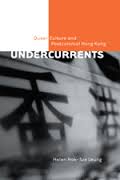 Undercurrents: Queer Culture and
Undercurrents: Queer Culture and
Postcolonial Hong Kong
by Helen Hok-Sze Leung
University of British Columbia Press.
168 pages, $32.95
Queerness, removed from the identity politics that reduce us to static categories, is difficult to embody. Tides of international influence, local histories, and new media swirl with potential for new ways of knowing. Part of UBC Press’s Sexuality Studies series, Undercurrents takes pleasure in destabilizing perspectives on both postcolonial Hong Kong and tongzhi (literally “comrade,” the irreverent umbrella term adopted by Chinese sexual minorities). Drawing on many aspects of cultural production, from poetry and song lyrics to film, radio, tabloids, and user-driven websites, Leung examines the ways in which tongzhi exists in the collective consciousness. A poignant example is made of famed actor and singer Leslie Cheung, whose flamboyant public life (which ended by suicide in 2003) “encapsulated the culmination and then termination of all the historical factors that had nurtured and made Hong Kong a success.” In Cheung’s story, Leung also uncovers valuable ways of blending queerness into traditional kinship structures. Her writing slides into the first person when she examines the difficulty of transgender activism in Hong Kong, noting “a recognizable subject must first exist” before minimal legal protections can be won. The close attention paid to complex gender representations, a central part of Hong Kong’s theatrical history that reappears contemporary film, makes Undercurrents an important contribution to the growing body of work on gender diversity. Whether examining Hong Kong’s identity, the homoerotic (perhaps polyerotic) threads in popular Hong Kong film, the liberating relationships between students in all-girl schools, kinship networks, or the next wave of web-based activism, Undercurrents participates in the buzzing work while upholding rigorous standards of scholarship.
Patty Comeau
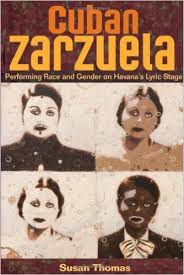 Cuban Zarzuela: Performing Race and
Cuban Zarzuela: Performing Race and
Gender on Havana’s Lyric Stage
by Susan Thomas
University of Illinois Press. 250 pages, $40.
The zarzuela we know today was developed in the second half of the 19th century in Spain as a parallel to the operetta form that Offenbach and others were popularizing at that time in France. Three Cuban composers working with a variety of librettists created their own version of it in Havana in the 1920’s, 30’s, and 40’s, much influenced by the popular theater that had preceded it. Susan Thomas’ book is a study of about a dozen of these Cuban zarzuelas, some still performed, others largely forgotten or even lost. She never broaches the issue of homosexuality, which evidently did not figure in these works. Instead, she shows that black male and mixed-race female characters were sometimes given characteristics of the opposite sex as a way of ridiculing them. White male leads were also sometimes assigned traditionally female traits, not to degrade them but to show that some white men were irrational and allowed themselves to be controlled by their desires. Only the white female characters remained within their tradition-assigned bounds. The intriguing thing about all this is that the audience for these works was largely bourgeois women. Going to the theaters that produced them was one of the few opportunities they had to be seen in public, sometimes even without a male escort. Yet these works feature white ingénues who do not challenge the conservative social mores of Cuban culture of the era, and while they glorify marriage, they repeatedly depict white men as philanderers. That leaves the reader wanting to know what the female audience got out of these works, and how important they were in the social activity of attending the performances.
Richard M. Berrong
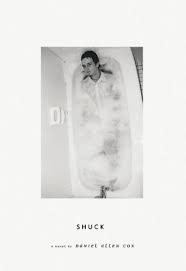 Shuck
Shuck
by Daniel Allen Cox
Arsenal Pulp Press. 149 pages
$14.95 (paper)
In Shuck, Daniel Allen Cox’s often hilarious, sometimes erotic novel set in 1990’s New York City, our (anti-)hero Jaeven Marshall cruises about the city, working as a thoroughly self-centered hustler and porn star grappling with attention deficit disorder (ADD). Cox’s prose bounds along as we follow Marshall through his tawdry adventures—encounters with tricks, lows and highs involving meth addiction, and receiving harsh rejection letters from publishers. Oh, Marshall is also an aspiring writer, and the book gently and subtly makes the connection between scribe and whore. It’s but one of Shuck’s droll conceits. The title refers to the verb shuck, which means to quickly drop one’s pants (in this case, for tricks). And while Shuck is billed as fiction, our knowledge of the author’s real-life escapades as a recovering Jehovah’s Witness who ventured to New York as a hustler and porn star as an escape route (during the same period in which the book is set, no less) give the entire affair a sense of documentary realism. Alternately brutal and witty, Shuck is an episodic book, an exhilarating ride in which the protagonist performs a kind of wistful eulogy for the seediness of the pre-Giuliani Manhattan. There’s something rather likable about Marshall, as he films his first porn shoot, topping a series of ludicrously brain-dead bottoms. As Shuck draws to a close, the author subtly points to a rethinking of our culture’s larger attitudes towards sex workers. That Cox manages to convey these larger ideas without heavy-handedness makes Shuck one of those rare books that has both ample brains and raunchy sex appeal.
Matthew Hays




